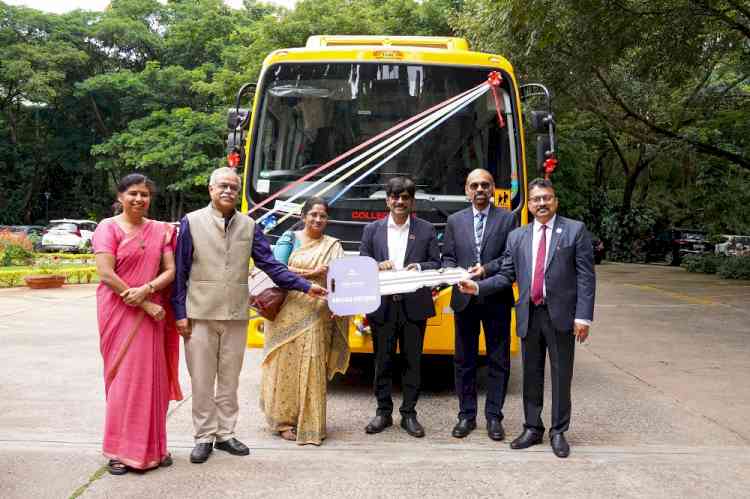IIM Bangalore and NeSL inaugurate electric bus to advance sustainable mobility on campus
Canara Bank and NeSL leadership champion power of collaboration in advancing sustainability through digital transformation

Bengaluru, October 24, 2025: Earlier today, the Indian Institute of Management Bangalore (IIMB) and the National E-Governance Services Ltd (NeSL) marked a significant milestone in their shared commitment to environmental responsibility with the inauguration of an electric bus on the IIMB campus. The initiative, supported by NeSL under its Sustainability Programme, represents a collective effort to promote clean mobility and reduce carbon emissions.
The flagging-off ceremony was held in the presence of Debajyoti Ray Chaudhuri, Managing Director and CEO, NeSL; Nivedita E.P., Executive Director, NeSL; Bhavendra Kumar, Executive Director, Canara Bank; Prof. U. Dinesh Kumar, Director In-charge, IIMB; Prof. Haritha Saranga, Chairperson, Sustainability Taskforce at IIMB, Production & Operations Management (POM) area; Prof. M. Jayadev, Dean Administration, IIMB; and Rohit Jaisingh, CEO, IIMB Development Foundation.
As part of the event, a felicitation ceremony was held to honour Canara Bank officials for their exemplary performance and contribution to the Bank’s green and digital initiatives, undertaken in collaboration with NeSL. Recognised as ‘Green Warriors’, the awardees received Certificates of Merit across various segments—Top 10 performers in the Gold Loan portfolio, Top 5 performers in the Vehicle Loan portfolio, along with officials from the Retail, Gold Loan, and IT/LAPS Wings at the Head Office in Bengaluru, the Global Trade Processing Centre in Manipal, and the Best Performing Branch in the issuance of electronic Bank Guarantees (eBG). The felicitation acknowledged their efforts in driving operational efficiency, customer experience, and digital adoption within the framework of sustainable banking practices.
In his address, Debajyoti Ray Chaudhuri extended a warm welcome to the IIMB community. On NeSL’s broader sustainability vision, he noted that electric vehicles are not only environmentally friendly but also more efficient than fuel-burning vehicles due to less energy loss incurred. NeSL, he added, has been supporting related projects at IIMB, such as the installation of fast-charging EV stations and solar panels, to strengthen the campus’s sustainability ecosystem. “We hope every visitor to this campus sees it as a model of environmental stewardship that inspires change beyond its boundaries”, he said.
Chaudhuri also spoke about NeSL’s Digital Document Execution (DDE) initiative, the first-of-its-kind paperless execution and financial contracts storage platform in India, which promotes cost efficiency, digital transformation, and sustainability by reducing paper-based processes. He acknowledged Canara Bank’s partnership in advancing this innovation from proof of concept to a scalable national product and commended the bank’s leadership team for their dedication to green innovation.
Prof. U. Dinesh Kumar, Director In-charge, IIM Bangalore, delivered the opening remarks. He expressed gratitude to NeSL and Canara Bank for their continued partnership and support in advancing IIMB’s sustainability initiatives. He acknowledged NeSL’s strong association with the Institute through projects such as the installation of solar panels and EV charging stations and reiterated IIMB’s aspiration to serve as a thought leader by sharing its best practices with peer institutions. He also commended the efforts of the administration and real estate teams in implementing key infrastructure measures, including the development of 75 recharge wells on campus.
Prof. Haritha Saranga, Chairperson of the IIMB Sustainability Taskforce, spoke about the Institute’s ongoing sustainability journey and the responsibility of every organisation to adopt environmentally conscious practices. On IIMB’s integrated approach to managing water, energy, and waste, she noted that the 100-acre campus is home to over 25,000 trees across diverse species and hosts several thousand birds – bearing testimony to the Institute’s thriving ecosystem.
She outlined IIMB’s water sustainability efforts, describing how rooftop rainwater is harvested across six primary collection points – five sumps with a capacity of 50,000 litres each and one with 100,000 litres – while additional recharge wells capture groundwater, amounting to 1.43 million litres of rainwater annually. These initiatives have helped raise the water table to 6.5 metres, enabling borewells to meet up to 20% of the campus’s domestic water requirements.
She elaborated on IIMB’s energy rulebook, which aims to maximise solar power generation and achieve Net Zero targets across Scope 1 and 2 emissions. The campus hosts solar water heaters, a biogas plant, and an extensive rooftop solar power installation, with the goal of reducing dependence on conventional energy sources.
Speaking of IIMB’s robust waste segregation and management system, she highlighted NSRCEL-incubated Padcare, a start-up that has developed technology to recycle sanitary waste, thereby reducing reject waste at IIMB to just 5%. She concluded by sharing that the Institute has achieved a 10% reduction in overall carbon emissions over the past five years.
Bhavendra Kumar, Executive Director, Canara Bank, reflected on the Bank’s 120-year legacy and its deep roots in Karnataka, a heritage it shares with IIM Bangalore. Speaking of the Bank’s partnership with NeSL, he emphasized how digital innovations such as the Digital Document Execution (DDE) platform have streamlined gold loan processing, reducing both time and cost for banks and customers alike.
He also spoke of Canara Bank’s growing investment in technology, its extensive suite of online banking services offering over 300 features, and its engagement with fintech and start-up ecosystems. Touching upon the Bank’s CSR commitments, Shri Kumar noted that its initiatives span education, health, and infrastructure, particularly in Karnataka, where the Bank was founded. On the Bank’s approach to sustainable finance, he observed that environmental, social, and governance (ESG) principles are now embedded within its risk management framework, with focused attention on both physical and transition risks associated with climate change.



 City Air News
City Air News 










